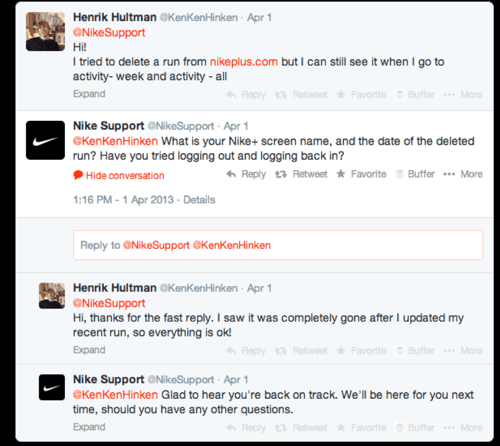How does social media help companies with communications and reputation?
By Nina SharpeJune 27, 2023
Find out why your business needs a strong social media presence for corporate communications and reputation management.
 The digital age has led to social media becoming an integral part of corporate communications and reputation management. We’re now living in an era where Facebook, Instagram, Twitter, LinkedIn, and even TikTok are revolutionizing how businesses interact with customers, employees, investors, and the general public.
The digital age has led to social media becoming an integral part of corporate communications and reputation management. We’re now living in an era where Facebook, Instagram, Twitter, LinkedIn, and even TikTok are revolutionizing how businesses interact with customers, employees, investors, and the general public.
Social media often gets referred to as “shared media,” and for good reason. It’s easy to share everything from images and opinions to reviews and recommendations in just a few seconds. Social media also has extensive reach with millions of people around the world logging in to different platforms every day. This shareability makes it an ideal tool for businesses to potentially share content with mass audiences in real-time.
Audio: Listen to this article.
Here are some reasons why social media is important in these realms of a business' public relations:
Broad Reach
Social media platforms provide an unparalleled opportunity for corporations to reach and engage with a global audience. Most of these platforms have millions, or even billions, of active users. Therefore, companies use social media to directly communicate with customers, stakeholders, and the general public. For example, they can share updates, address concerns, and build relationships.
Real-Time Engagement
Social media enables a company to engage with users in real-time. For instance, companies can promptly respond to customer queries, mentions, reviews, or complaints to demonstrate their commitment to customer service. This opportunity for responsiveness helps to quickly resolve issues and prevent potential reputational damage.
Additionally, real-time engagement on social media can foster transparency and trust. This helps a company to build relationships and keep its customers satisfied.
Customer Relationship Management through Market Insights
Companies use social media platforms to provide valuable data and insights about consumer behavior, preferences, and sentiment.
Corporations can use analytics and social listening to:
- Monitor online conversations
- Identify market trends
- Gain insights into public opinion
Companies can then use the data and market insights to make strategic decisions and help shape effective communication strategies with their stakeholders. Using this customer-centric approach, companies can build long-term relationships, customer loyalty, and a positive brand reputation.
Brand Building and Visibility
Businesses use social media to shape and amplify their corporate brand identity. They can establish a brand identity by sharing their values, mission, and company culture with a global audience. Additionally, regularly posting engaging content, such as articles, infographics, community initiatives, and short videos, can help reinforce brand awareness and loyalty.
The social media platforms that work best for a business depends on the industry and sector of operation. However, Facebook has the highest reach globally at around 2 billion users, while Instagram is close behind at approximately 1.9 billion.
Monitoring and Reputation Management
Social media is a valuable resource for monitoring a company's online presence in real-time. When a company actively monitors mentions, discussions, and hashtags related to its brand, it can act quickly and manage its reputation. The immediacy of social media allows prompt responses to customer inquiries or negative comments and addresses potential reputation risks.
Through proactive reputation management on social media, a company can safeguard its image and maintain positive brand perception.
It can be as simple as fast responses to customer inquiries online.

Crisis Management
Because of social media's broad reach, it’s an essential tool for managing and controlling the narrative of crises and emergencies. A customer issue, negative comment, poor review, or any other bad press thrusts a company into the media spotlight, and the need to act quickly and effectively becomes all-important. In such a case, a company can use social media to swiftly address issues, provide updates, and reassure customers and stakeholders about their plans and actions.
Proactive engagement on social media helps a company maintain transparency, mitigate reputational harm, demonstrate accountability, and showcase its commitment to resolving issues.
Thought Leadership and Industry Influence
Companies use social media platforms to establish themselves as thought leaders in their respective industries. Using online platforms, they can position themselves as knowledgeable and influential authorities by sharing the following on social media:
- Valuable and informative content
- Ground-breaking ideas and discoveries
- Thought-provoking content
- Industry insights
- Expert opinions
Doing so can help build the company's credibility, attract a following of loyal customers, and improve or maintain the overall brand reputation.
Influencer Marketing
In recent years, social media influencers have gained significant influence over consumer purchasing decisions and support. Therefore, many companies partner with relevant social media influencers to help reach their target audience effectively. Influencers can promote a company's products or services, share their positive experiences, and enhance brand credibility, trust, and following.
Employee Advocacy
Statistics show brand messages reach 561% further when employees share them as opposed to official brand channels. It makes sense then that many companies encourage their employees to be brand advocates on social media.
Employees can share company news, achievements, and positive experiences on their personal social media accounts. When employees are proud ambassadors for their company, they can amplify the brand's credibility and reach, help attract talent, and create a positive corporate culture.
LinkedIn, for example, is a popular social platform designed specifically for business networking. This is a common and popular site for employees to easily share company messages and branding initiatives.
Competitive Advantage
Companies can gain a competitive edge by effectively using social media. When a company has a solid online presence and engages with its customers, it fosters brand loyalty and differentiates itself from competitors.
Additionally, a company can use social media to conduct market research, analyze its competitors, and keep abreast of marketing trends. This allows it to stay ahead of the game and better understand how to calculate profit margin and ROI from marketing campaigns.
The Advantages of Outsourcing Social Media PR
When used effectively, social media is an excellent tool for corporate communications and managing a company's reputation. However, it takes a keen eye and dedicated person or team to manage its social media accounts. Mistakes can be far-reaching and put a company in a negative light. There are also external threats of account hacking, cloning, and cyber theft.
Those in charge of monitoring social media accounts need to know how to mitigate these threats while maintaining an evergreen and favorable company profile online. Therefore, many companies outsource their social media management to public relations specialists like Axia PR to ensure excellence.
Social media has become an essential component of corporate communications and reputation management. By using social media, businesses can enhance their brand's visibility, engage with stakeholders, and build customer relationships. Additionally, they can gain a competitive edge, establish thought leadership, and monitor and manage their online reputation.
By embracing social media as a part of their communication strategy, companies can adapt to the digital age, stay relevant, and maintain a positive brand image in a highly connected and interactive world.
Photo by Pixabay
Topics: reputation management, shared media, social media



Comment on This Article